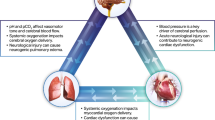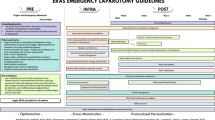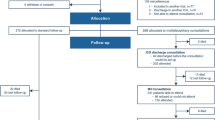Abstract
In 2015, the major critical care societies issued guidelines outlining a procedural approach to resolving intractable conflict between healthcare professionals and surrogates over life-sustaining treatments (LST). We report our experience with a resolving conflict procedure. This was a retrospective, single-centre cohort study of ethics consultations involving intractable conflict over LST. The resolving conflict process was initiated eleven times for ten patients over 2,015 ethics consultations from 2000 to 2020. In all cases, the ethics committee recommended withdrawal of the contested LST. In seven cases, the patient died or was transferred or a legal injunction was obtained before completion of the process. In the four cases in which LST was withdrawn, the time from ethics consultation to withdrawal of LST was 24.8 ± 12.2 days. Healthcare provider and surrogate were often distressed during the process, sometimes resulting in escalation of conflict and legal action. In some cases, however, surrogates appeared relieved that they did not have to make the final decision regarding LST. Challenges regarding implementation included the time needed for process completion and limited usefulness in emergent situations. Although it is feasible to implement a due process approach to conflict over LST, there are factors that limit the procedure’s usefulness.
Similar content being viewed by others
Data Availability
The dataset genereated and analyzed for the current study is not publically available due to patient confidentiality and privacy protections.
Notes
In the Matter of Quinlan. 1976. 70, (N.J.) 355, A.2d 647; Brophy v. New England Sinai Hospital, Inc. 1986. 398, (Mass.), 417; Cruzan v. Harmon. Cir. Crt 1990. 430, (M.O. 1988), 760 S.W.2d 408.
In the Matter of Barbara Howe. 2005. Docket 3, P1255 (Commonwealth of Massachusetts Probate and Family Court Department).
In the Matter of Barbara Howe. 2005. Docket 3, P1255 (Commonwealth of Massachusetts Probate and Family Court Department).
References
Boslett, G.T., T.M. Pope, G.D. Rubenfeld, et al. 2015. Responding to requests for potentially inappropriate treatments in intensive care units. American Journal of Respiratory and Critical Care Medicine 191(11): 1318–1330.
Brody, B.A. and A. Halevy. 1995. Is futility a futile concept? Journal of Medicine and Philosophy 20(2): 123–144.
Chidwick, P., R. Sibbald, and L. Hawryluck. 2013. Best interests at end of life: An updated review of decisions made by the consent and capacity board of Ontario. Journal of Critical Care 28(1): 22–27.
Council on Ethical and Judicial Affairs. 2022. American Medical Association Code of Medical Ethics. https://www.ama-assn.org/delivering-care/ethics/code-medical-ethics-overview. Accessed June 4, 2022.
Dzeng, E., A. Colaianni, M. Roland, et al. 2015. Influence of institutional culture and policies on do-not-resuscitate decision making at the end of life. JAMA Internal Medicine 175(5): 812–819.
Fine, R. 2009. Point: The Texas advance directives act effectively and ethically resolves disputes about medical futility. CHEST 136(4): 963–967.
Fine, R.L. and T.W. Mayo. 2003. Resolution of futility by due process: Early experience with the Texas Advance Directives Act. Annals of Internal Medicine 138(9): 743–746.
Halevy, A. and B.A. Brody. 1996. A multi-institution collaborative policy on medical futility. Journal of the American Medical Association 276(7): 571–574.
Helft, P.R., M. Siegler, and J. Lantos. 2000. The rise and fall of the futility movement. New England Journal of Medicine 343(21): 293–296.
Kapottos, M., and S. Youngner. 2015. The Texas Advanced Directive Law: Unfinished business. The American Journal of Bioethics 15(8): 34–38.
Kon, A.A., E.K. Shepard, N.O. Sederstrom, et al. 2016. Defining futile and potentially inappropriate interventions: A policy statement from the Society of Critical Care Medicine Ethics Committee. Critical Care Medicine 44(9): 1769–1774.
Kowalczyk, L. 2005. Woman dies at MGH after battle over care, Boston Globe, June 8.
Plows, C.W., R.M. Tenery, A. Hartford, et al. 1999. Medical futility in end-of-life care: Report of the Council on Ethical and Judicial Affairs. Journal of the American Medical Association 281(10): 937–941.
Presidents Commission for the Study of Ethical Problems in Medicine and Biomedical and Behavioral Research. 1983. Deciding to forego life-sustaining treatment: Ethical, medical, and legal issues in treatment decisions. Washington, DC: Government Printing Office.
Robinson, E.M., W. Cage, K. Erler, et al. 2017. Structure, operation, and experience of clinical ethics consultation 2007–2013: A report from the Massachusetts General Hospital Optimum Care Committee. The Journal of Clinical Ethics 28(2): 137–152.
Rubin, E. and A.M. Courtwright. 2013. Medical futility procedures: What more do we need to know? CHEST 144(5): 1707–1711.
Schneiderman, L.J. , N.S. Jecker, and A.R. Jonsen, 1990. Medical futility: Its meaning and ethical implications. Annals of Internal Medicine 112(12): 949–954.
Smith, M.L., G. Gremillion, J. Slomka, et al. 2007. Texas hospitals experience with the Texas Advance Directives Act. Critical Care Medicine 35(5): 1271–1276.
Tomlinson, T. and D. Czlonka. 1995. Futility and hospital policy. Hastings Center Report 26(3): 28–35.
Truog, R.D. Tackling medical futility in Texas. 2007. New England Journal of Medicine 357(1): 1–3.
Truog, R.D., A.S. Brett, and J. Frader. 1992. The problem with futility. New England Journal of Medicine 326(23): 1560–1564.
Waisel, D.B., and R.D. Truog. 1995. The cardiopulmonary resuscitation-not-indicated order: Futility Revisited. Annals of Internal Medicine 122(4): 304–308.
Author information
Authors and Affiliations
Corresponding author
Ethics declarations
Conflict of Interest
The author declares no conflicts of interest with respect to the authorship and/or publication of this article.
Additional information
Publisher's Note
Springer Nature remains neutral with regard to jurisdictional claims in published maps and institutional affiliations.
Rights and permissions
Springer Nature or its licensor (e.g. a society or other partner) holds exclusive rights to this article under a publishing agreement with the author(s) or other rightsholder(s); author self-archiving of the accepted manuscript version of this article is solely governed by the terms of such publishing agreement and applicable law.
About this article
Cite this article
Rubin, E.B., Robinson, E.M., Cremens, M.C. et al. Declining to Provide or Continue Requested Life-Sustaining Treatment: Experience With a Hospital Resolving Conflict Policy. Bioethical Inquiry 20, 457–466 (2023). https://doi.org/10.1007/s11673-023-10270-7
Received:
Accepted:
Published:
Issue Date:
DOI: https://doi.org/10.1007/s11673-023-10270-7




